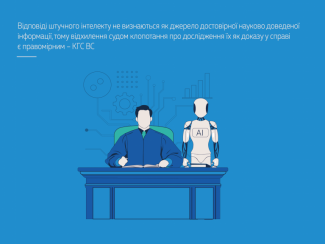Contact center of the Ukrainian Judiciary 044 207-35-46

Artificial intelligence can be a useful and auxiliary informative tool in the field of justice, but it cannot replace either a judge or the principles of relevance, admissibility and reliability of evidence provided for in Chapter 5 "Evidence and Proof" of the Commercial Procedural Code of Ukraine.
This conclusion was reached by a panel of judges of the Commercial Cassation Court of the Supreme Court.
The city council filed a lawsuit against the LLC to amend the land lease agreement and oblige it to recalculate the rent.
The claim was motivated by the need to harmonise the terms of the lease agreement with the decision of the city council.
The decision of the commercial court, upheld by the decision of the Commercial Court of Appeal, partially satisfied the claim, namely, amended the land lease agreement.
The SC CommCC upheld the decisions of the courts of previous instances.
The SC CommCC rejected the defendant's reference to the fact that the court of appeal had unreasonably rejected the motion to examine electronic evidence, namely the response of two artificial intelligences - Grok (developed by xAI) and ChatGPT (developed by OpenAI) - to confirm the literal interpretation of clause 23(6) of the agreement, and noted the following.
The panel of judges emphasised that technology should only be used to support and strengthen the rule of law. Technology can only be used to support and assist courts and judges in the proper management and determination of proceedings. Decision-making should, explicitly or implicitly, be reserved for judges. It cannot be delegated or performed by technology, and judicial autonomy must be respected.
Instead, in the case at hand, the participant uses artificial intelligence technology not as a means of facilitating the administration of due process, but rather to challenge (question, appeal) the conclusions already reached by the court.
Answers of artificial intelligence are not recognised as a source of reliable scientifically proven information, so the court's rejection of the petition to examine them as evidence in the case is lawful.
Resolution of the Commercial Cassation Court of the Supreme Court of 8 July 2025 in case No. 925/496/24 - http://reyestr.court.gov.ua/Review/128775966.
This and other legal positions of the Supreme Court can be found in the Database of Legal Positions of the Supreme Court - https://lpd.court.gov.ua.